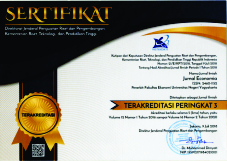Ethical Stock Portfolios : Does It Have High Risk and Low Return
Downloads
This study examines the comparison of stock performance as measured using the return and risk of stock portfolios of ethical and non-ethical companies on the Indonesia Stock Exchange. Portfolio formation using a single index model during 2016-2019. The data analysis technique uses an independent sample t-test with a significance level of 5%. The results showed that there were no differences in portfolio return and risk. The average portfolio return is 0.22% for ethical stocks and 0.27% for non-ethical stocks. There is also no significant difference in portfolio risk, 0.87% for ethical stock portfolios and 0.99% for non-ethical stocks. This research has implications for investors who are interested in ethical stocks where they don't have to worry about high portfolio risk and low returns because the results show that the SRI KEHATI index stock portfolio provides the same level of risk and return as the LQ45 index stock portfolio.
Downloads
Aduardus, T. (2011). Fortofolio dan Investasi: Teori dan Aplikasi. Yogyakarta: Kanisius.
Ballestero, E., Bravo, M., Gladish, B. P., Parra, M. A., & Pla-Santamaria, D. (2012). Socially Responsible Investment: A Multicriteria Approach To Portfolio Selection Combining Ethical And Financial Objectives. European Journal of Operational Research, 216(2), 487–494.
Bourgias, A., & Spanos, E. (2019). Socially Responsible Investments: Does it pay to be responsible? Copenhagen Business School.
BrzeszczyÅ„ski, J., & McIntosh, G. (2014). Performance of Portfolios Composed of British SRI Stocks. Journal of Business Ethics, 120(3), 335–362.
Derwall, J., Koedijk, K., & Horst, J. Ter. (2011). A Tale of Values-Driven and Profit Seeking Social Investor. Journal of Banking & Finance, 35(8), 2137–2147.
Diaz, J. F. T. (2016). Return And Volatility Performance Comparison Of Ethical And Non-Ethical Publicly-Listed Financial Services Companies. Ethics and Economics, 13(1), 12–24.
Han, X., Li, Y., & Onishchenko, O. (2021). Shunned Stocks and Market States. SSRN.
Humphrey, J. E., & Lee, D. D. (2011). Australian Socially Responsible Funds: Performance, Risk and Screening Intensity. Journal of Business Ethics, 102, 519–535.
Kreander, N., Gray, R. H., Power, D. M., & Sinclair, C. D. (2005). Evaluating The Performance of Ethical and Non-ethical Funds: A Matched Pair Analysis. Journal of Business Finance & Accounting, 32(7–8), 1465–1493.
Mattsson, A., & Sandstrí¶m, L. (2014). A Comparison between the Performance of Ethical and Conventional US Funds Do Different Ethical Characteristics Matter? University of Gothenburg.
Musfialdy. (2019). The Relationship Between Investment Decisios, Environmental Concerns and Environmenal Performance on Corporate Social Responsibility. Journal of Applied Management, 17(1), 30–36.
Ortas, E., Moneva, J. M., & Salvador, M. (2014). Do social and environmental screens influence ethical portfolio performance? Evidence from Europe. BRQ Business Research Quarterly, 17(1), 11–21. https://doi.org/10.1016/j.cede.2012.11.001
Pertiwi, D. N., & Meirinaldi. (2016). Analisis Perbedaan Kinerja Portofolio Optimal Indeks Sri Kehati dan LQ45 Periode 2010-2014. Jurnal Ekonomi, 18(3), 311–333.
PT Schroder Investment Management Indonesia. (2016). Negara-negara dengan investor yang paling "Peduli" terhadap isu Lingkungan, Sosial dan Tata Kelola. Retrieved May 17, 2019, from https://www.schroders.com/id/id/investasi-reksadana/ulasan-berita/studi-investor-global/negara-negara-dengan-investor-yang-paling-peduli-terhadap-isu-lingkungan-sosial-dan-tata-kelola/
Robiyanto, R., Nugroho, B. A., & Lako, A. (2020). Safe haven and performance of extension-Markowitz portfolio on Indonesian ethical investments. International Journal of Economic Policy in Emerging Economies, 13(3), 225–243. https://doi.org/10.1504/IJEPEE.2020.109051
Sharp, W. F., Alexander, G. J., & Bailey, J. V. (2005). Investasi (6th ed.). Jakarta: PT Indeks Kelompok Gramedia.
Simister, J., & Whittle, R. (2013). Ethical Investment and Portfolio Theory: Using Factor Analysis to Select a Portfolio. Journal of Mathematical Finance, 3, 145–152.
Tas, O., Tokmakcioglu, K., Urgulu, U., & Isiker, M. (2016). Comparison of ethical and conventional portfolios with second-order stochastic dominance efficiency test. International Journal of Islamic and Middle Eastern Finance and Management, 9(4), 492–511.
Valbury. (2019). Investasi Hijau, Investasi Demi Pelestarian Lingkungan Hidup. Retrieved May 17, 2019, from https://satutumbuhseribu.valbury.co.id/2018/10/02/investasi-hijau-demi-lingkungan-hidup/
Wallis, M. von, & Klein, C. (2015). Ethical Requirement And Financial Interest: A Literature Review On Socially Responsible Investing. Business Research, 8, 61–98.
Wang, Y. G. (2011). Corporate Social Responsibility and Stock Performance-Evidence From Taiwan. Modern Economy, 2(5), 788–799.















